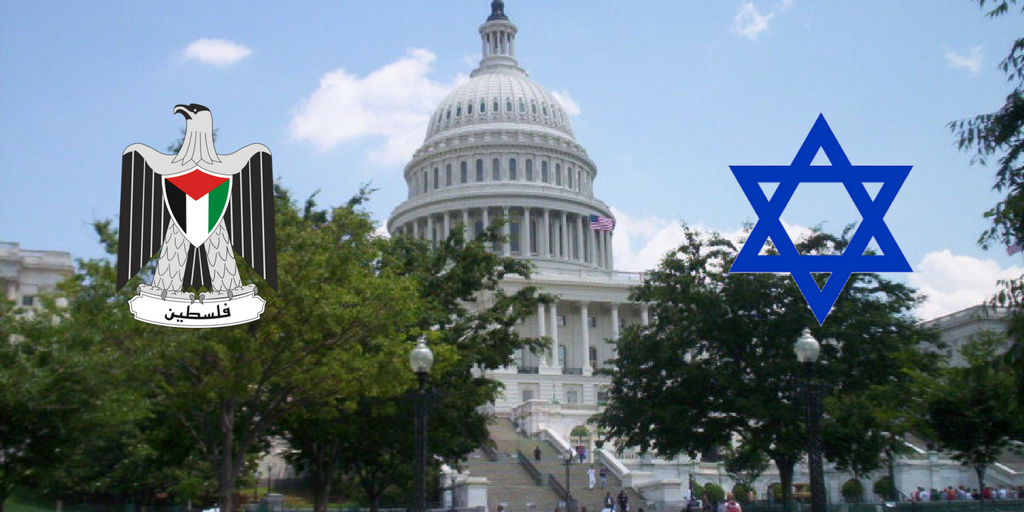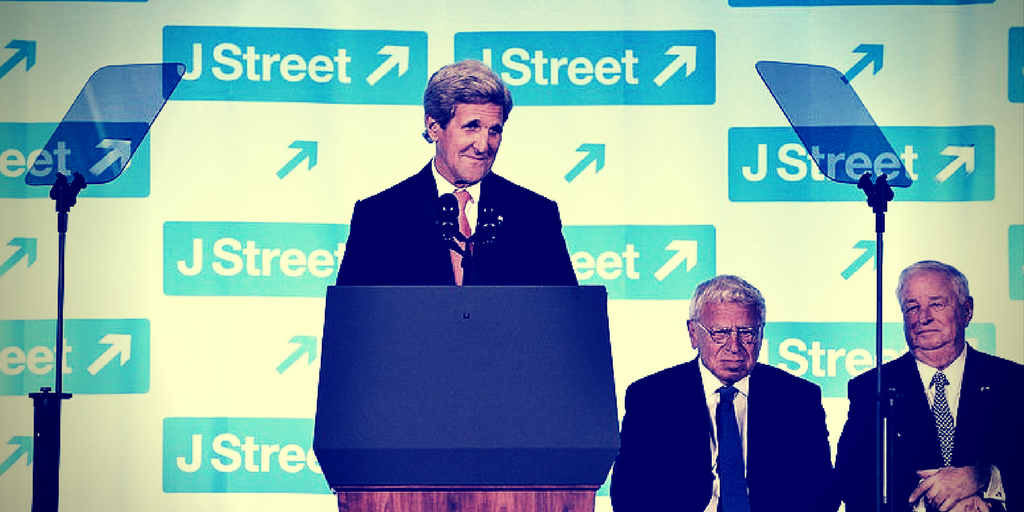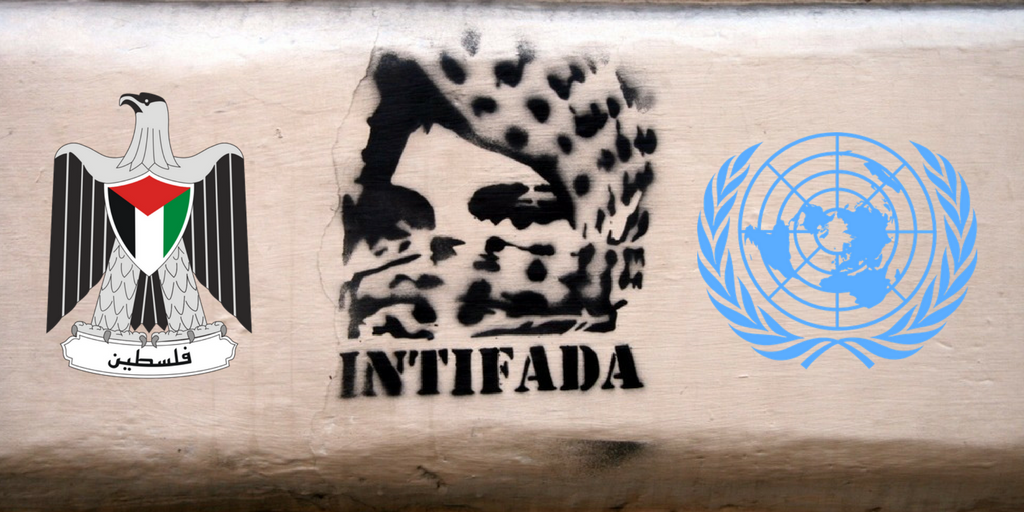David Friedman, President Trump’s nominee for ambassador to Israel is heckeled by pro-“Palestinian” activists throughout his opening statement during his nomination hearing.
THE END OF PALESTINE
Israel has the opportunity to reclaim its nation.
Palestine is many things. A Roman name and a Cold War lie. Mostly it’s a justification for killing Jews.
Palestine was an old Saudi-Soviet scam which invented a fake nationality for the Arab clans who had invaded and colonized Israel. This big lie transformed the leftist and Islamist terrorists run by them into the liberators of an imaginary nation. Suddenly the efforts of the Muslim bloc and the Soviet bloc to destroy the Jewish State became an undertaking of sympathetically murderous underdogs.
But the Palestine lie is past its sell by date.
What we think of as “Palestinian” terrorism was a low-level conflict pursued by the Arab Socialist states in between their invasions of Israel. After several lost wars, the terrorism was all that remained. Egypt, Syria and the USSR threw in the towel on actually destroying Israel with tanks and jets, but funding terrorism was cheap and low-risk. And the rewards were disproportionate to the cost.
For less than the price of a single jet fighter, Islamic terrorists could strike deep inside Israel while isolating the Jewish State internationally with demands for “negotiations” and “statehood.”
After the Cold War ended, Russia was low on cash and the PLO’s Muslim sugar daddies were tired of paying for Arafat’s wife’s shoe collection and his keffiyah dry cleaning bills.
The terror group was on its last legs. “Palestine” was a dying delusion that didn’t have much of a future.
That’s when Bill Clinton and the flailing left-wing Israeli Labor Party which, unlike its British counterpart, had failed to adapt to the new economic boom, decided to rescue Arafat and create ”Palestine”.
The resulting terrorist disaster killed thousands, scarred two generations of Israelis, isolated the country and allowed Jerusalem, Tel Aviv and other major cities to come under fire for the first time since the major wars. No matter how often Israeli concessions were met with Islamic terrorism, nothing seemed able to shake loose the two-state solution monkey on Israel’s back. Destroying Israel, instantaneously or incrementally, had always been a small price to pay for maintaining the international order.
The same economic forces that were transforming the world after the Cold War had salvaged “Palestine”. Arafat had lost his sponsors in Moscow, but his new sugar daddy’s name was “Globalism”.
The Cold War had been the focus of international affairs. What replaced it was the conviction that a new world tied together by international commerce, the internet and international law would be born.
The demands of a clan in Hebron used to be able to hijack the attention of the world because the scope of the clash between Capitalism and Communism could globalize any local conflict. Globalization was just as insistent on taking local conflicts and making them the world’s business through its insistence that every place was connected. The terrorist blowing up an Israeli pizzeria affected stock prices in New York, the expansion prospects of a company in China and the risk of another terrorist attack in Paris. And interconnectedness, from airplane hijacking to plugging into the international’s left alliance of global protest movements, had become the best weapon of Islamic terrorists.
But now globalization is dying. And its death may just take “Palestine” with it.
A new generation of leaders is rising who are actively hostile to globalization. Trump and Brexit were the most vocal rebukes to transnationalism. But polls suggest that they will not be the only ones. The US and the UK, once the vanguards of the international order, now have governments that are competitively seeking national advantages rather than relying on the ordered rules of the transnational safety net.
These governments will not just toss aside their commitment to a Palestinian state. Not when the Saudis, Qataris and countless other rich and powerful Muslim countries bring it up at every session.
But they will be less committed to it.
45% of Americans support the creation of a PLO state. 42% are opposed. That’s a near split. These historical numbers have to be viewed within the context of the larger changes sweeping the country.
The transnationalists actively believed that it was their job to solve the problems of other countries. Nationalists are concerned with how the problems of other countries directly impinge on them without resorting to the mystical interconnectedness of everything, from climate change to global justice, that is at the core of the transnational worldview.
More intense competition by Western nations may make it easier for Islamic agendas to gain influence through the old game of divide and conquer. Nations facing terrorism will still find that the economic influence of Islamic oil power will rally the Western trading partners of Islam against them.
But without the transnational order, such efforts will often amount to little more than lip service.
Nationalist governments will find Israel’s struggle against the Islamic invaders inconvenient because it threatens their business interests, but they will also be less willing to rubber stamp the terror agenda the way that transnationalist governments were willing to do. The elimination of the transnational safety net will also cause nationalist governments to look harder at consequences and results.
Endlessly pouring fortunes into a Palestinian state that will never exist just to keep Muslim oil tyrants happy is not unimaginable behavior even for a nationalist government. Japan has been doing just that.
But it will be a less popular approach for countries that don’t suffer from Japan’s energy insecurity.
Transnationalists are ideologically incapable of viewing a problem as unsolvable. Their faith in human progress through international law made it impossible for them to give up on the two-state solution.
Nationalist governments have a colder and harder view of human nature. They will not endlessly pour efforts and resources into a diplomatic black hole. They will eventually take “No” for an answer.
This won’t mean instantaneous smooth sailing for Israel. It will however mean that the exit is there.
For two decades, pledging allegiance to the two-state solution and its intent to create a deadly Islamic terror state inside Israel has been the price demanded of the Jewish State for its participation in the international community. That price will not immediately vanish. But it will become easier to negotiate.
The real change will be on the “Palestinian” side where a terrorist kleptoracy feeds off human misery in its mansions downwind of Ramallah. That terror state, conceived insincerely by the enemies of the West during the Cold War and sincerely brought into being by Western transnationalists after the Cold War ended, is a creature of that transnational order.
The “Palestinian Authority”, a shell company of the PLO which is a shell company of the Fatah terrorists, has no economy worth speaking of. It has foreign aid. Its diplomatic achievements are achieved for it by the transnational network of foreign diplomats, the UN, the media and assorted international NGOs. During the last round of “negotiations”, Secretary of State John Kerry even attempted to do the negotiating on behalf of the Palestinian Authority in the talks with Israel.
Take away the transnational order and the Palestinian Authority will need a new sugar daddy. The Saudis are better at promising money than actually delivering it. Russia may decide to take on the job. But it isn’t about to put in the money and resources that the PA has grown used to receiving from us.
Without significant American support, the Palestinian Authority will perish. And the farce will end.
It won’t happen overnight. But Israel now has the ability to make it happen if it is willing to take the risk of transforming a corrosive status quo into a conflict that will be more explosive in the short term, but more manageable in the long term.
Prime Minister Netanyahu, in stark contrast to rivals on the left like Peres and on the right like Sharon, is not a gambler. The peace process was a big gamble. As was the withdrawal from Lebanon and the expulsion from Gaza. These gambles failed and left behind scars and enduring crises.
Unlike the prime ministers before and after him, Netanyahu has made no big moves. Instead he serves as a sensible steward of a rising economy and a growing nation. He has stayed in office for so long because Israelis know that he won’t do anything crazy. That sensible stewardship, which infuriated Obama who accused him of refusing to take risks, has made him one of the longest serving leaders in Israeli history.
Netanyahu is also a former commando who participated in the rescue of a hijacked airplane. He doesn’t believe in taking foolish risks until he has his shot all lined up. But the time is coming when not taking a risk will be a bigger risk than taking a risk. Eventually he will have to roll the dice.
The new nationalist wave may not hold. The transnational order may return. Or the new wave may prove darker and more unpredictable. It’s even possible that something else may take its place.
The status quo, a weak Islamist-Socialist terror state in Ramallah supported by the United States, a rising Muslim Brotherhood terror state in Gaza backed by Qatar and Turkey, and an Israel using technological brilliance to manage the threat from both, is already unstable. It may collapse in a matter of years.
The PLO has inflicted a great deal of diplomatic damage on Israel and Hamas has terrorized its major cities. Together they form an existential threat that Israel has allowed to grow under the guise of managing it. The next few years may leave Israel with a deadlier and less predictable struggle.
“Palestine” is dying. Israel didn’t kill it. The fall of the transnational order did. The question is what will take its place. As the nationalist wave sweeps the West, Israel has the opportunity to reclaim its nation.
Originally Published in FrontPageMag.
[huge_it_share]
J Street’s Dead End
At the end of 2017, the far-left Jewish advocacy group J Street will celebrate its 10th anniversary. At its inception, J Street promised to be the first political movement “to explicitly promote American leadership to resolve the Israeli-Palestinian conflict.” However, the organization’s pursuit of this goal was an abject and damning failure.
Circumstances couldn’t have been more amenable toward J Street’s lofty goal. Within 14 months of J Street’s inception, Barack Obama swept to power in elections that also left both houses of Congress controlled by Democrats.
As president, Obama’s approach to the Israeli-Palestinian conflict was groundbreaking in many ways, deviating from the positions and tone of his predecessors, both Republican and Democrat. J Street backed this shift with political cover, campaign donations, and organizational unanimity, providing a convenient panacea to American Jewish community outrage over Obama’s maneuvers.
The fledgling J Street found itself at the top table with veteran Jewish and pro-Israel organizations at the White House, with almost unprecedented access during Obama’s two terms.
It wasn’t merely a spectator: J Street saw itself as a vital part of the administration’s strategy and policy on Israel and the peace process. It prided itself on the puppeteer role it played in defending the White House or pushing its policy platform.
“We were the blocking-back, clearing space for the quarterback to do what we wanted him to do,” said J Street’s president, Jeremy Ben-Ami, in 2011. He added, Obama “hasn’t been able to push as aggressively as we would like,” and J Street has “switched from being out front and clearing the way, to pushing him to do something more.”
Something more turned out to be a lot less.
During the full eight years of the Obama administration, which set as one of its foreign policy goals a peaceful resolution to the Israel-Palestinian conflict, Israeli Prime Minister Benjamin Netanyahu and Palestinian Authority President Mahmoud Abbas never sat in the same room for more than a few hours in total.
While Netanyahu constantly repeated that he was willing to meet with the Palestinian leader at any place at any time, with no preconditions, Abbas made a series of impossible preconditions that pushed meaningful negotiations further and further away. J Street ended up blaming Netanyahu for Abbas’s intransigence.
Mutual distrust between the parties may not have been greater in a generation, and it could be argued that peace is as far away as it has been since the Oslo Peace Process began. J Street’s continued criticism of the Israeli government created a pseudo-Zionist political shield on the Jewish community’s left flank that the Obama administration used to blame Israel for actions largely caused by Palestinian obstinacy.
For eight years J Street supported Obama’s destructive policies toward Israel like the unilateral settlement freeze, nuclear détente with Iran, and his allowance for international condemnation of Israeli communities in the West Bank.
As a group that prided itself on its ability to make its voice heard in the American administration’s halls of power, J Street’s inability to influence must take a very heavy responsibility for the remission of the peace process.
Moreover, in its unrelenting vision of itself as chartering new territory, it lost many ideological allies.
At the end of 2008, when Israel decided to defend itself against incessant rocket attacks from the terrorist organization Hamas in the Gaza Strip, J Street attacked Israel’s defensive actions. Rabbi Eric Yoffie, president emeritus of the Union for Reform Judaism, called J Street’s reaction to Israeli policy “morally deficient, profoundly out of touch with Jewish sentiment and also appallingly naïve.”
In 2009, J Street initially tried to facilitate meetings between Richard Goldstone, lead author of a slanderous report on Israel’s war on terror in Gaza, and members of Congress.
In 2011, when it appeared to advocate for the U.S. not to veto a deeply problematic UN resolution condemning Israel, supporters like Democratic Congressman Gary Ackerman of New York cut ties with the organization.
J Street also placed itself out of mainstream pro-Israel circles when it invited prominent activists in the Boycott, Divestment, Sanctions (BDS) movement to its conferences and claimed that George Soros had not funded the organization until it became a matter of public record that he had in fact provided significant donations, especially during its formative years.
All of these hits have left the reputations of J Street and its combative president battered and bruised.
However, the latest election results have delivered the knock-out punch.
If perhaps the only selling point J Street could offer its potential donors in recent years has been largely unfettered (if squandered and ineffective) access to the White House, this will now be completely removed from the equation by the victory of Donald Trump and continued Republican control of both houses of Congress.
J Street has now become an organization vilified by former friends, distanced from the Left in Israel, and distrusted by many more. It may reconstitute itself in some constellation or another, but its heyday has past.
Originally Published in the Hill
The Livni-Fayyad two-step
MK Tzipi Livni is apparently well regarded at the UN. According to media reports, UN Secretary General Antonio Guterres called Livni and offered her the position of under-secretary-general.
Guterres’s offer to Livni is supposed to be a trade-off. Livni will receive the appointment in exchange for the US canceling its veto of his plan to appoint former Palestinian Authority prime minister Salaam Fayyad to serve as his envoy to Libya.
There are three basic problems with this proposed trade. First there is the problem with Fayyad.
Leaving aside the question of the actual duties of a UN envoy to Libya, the question is why would Fayyad be a good candidate for anything?
Before Fayyad joined the PLO-controlled PA in 2002, he served for six years as the International Monetary Fund’s representative to the PA. In that position, Fayyad turned a blind eye to the embezzlement of the donor-financed PA budget to the tune of hundreds of millions of dollars a year.
Year in and year out, Fayyad did nothing to warn donors that the funds that they were providing the PA were being transferred to Swiss bank accounts or otherwise disappearing. In 1997 for instance, Fayyad said nothing as Arafat and his cronies caused $323 million, or 40% of the PA budget, to simply disappear.
Perhaps if he had piped up back then the international community might have rethought its support for PLO chief Yasser Arafat as he built the PA into a terrorism-financing kleptocracy.
Arafat appointed Fayyad to serve as PA finance minister in 2002. In that position, Fayyad went from apologist to enabler. He presided over the PA budget and kept the international donations flowing knowing full well that Arafat and his cronies were embezzling the funds to enrich themselves and finance terrorism while the Palestinian people got record unemployment and were indoctrinated to despise Israel and the West.
Fayyad’s facilitation of the PLO bosses’ grand larceny continued after Arafat’s death in 2004. He happily enabled Mahmoud Abbas’s theft as well.
For instance, in 2004 Fayyad did nothing to stop the theft of revenues from oil products by his bosses as they emptied the coffers of the PA’s Petroleum Authority.
When PA lawmakers asked him that year for an accounting of where revenues from oil products disappeared to, according to Issam Abu Issa, the founder of the Palestinian International Bank, Fayyad declared nonchalantly, “Unfortunately the documents related to the revenues from oil products – or how the money was used – cannot be found. They have disappeared from the ministry.”
According to a 2013 report from the European Court of Auditors, between 2008 and 2012, $2.7 billion in EU aid to the PA disappeared. Fayyad presided over the PA treasury and government as finance minister and prime minister during those years.
Fayyad was also responsible for financing terrorism. As PA prime minister, Fayyad enjoyed the support of both Fatah and Hamas. Hamas supported him, among other things, because he sent monthly payments from the PA budget to the jihadist group in Gaza.
Under Fayyad’s leadership, the PA allocated 31% of its donor-based budget to its security forces. That is more than any government in the world and it raises questions about where all that money is actually going.
As prime minister, in 2011 Fayyad increased the PA’s payments to terrorists jailed in Israeli prison by 300%. More than 6% of the PA’s budget is now spent used to pay salaries to terrorists.
Then there is Fayyad’s role in inciting and leading the international campaign to destroy the Israeli economy and block any chance of friendly relations between Israelis and Palestinians.
As PA prime minister, in 2010, Fayyad promulgated a law criminalizing all Palestinian economic activity with Israelis beyond the 1949 armistice lines. He hired 650 troops and charged them with entering people’s homes and seizing all Israeli products they found there. He ordered the arrest of Palestinians who worked with Israelis.
In 2012 he extended the prohibition on economic cooperation and his boycott of Israeli products and businesses to include all Israeli territory. In so doing, he criminalized all economic cooperation between Palestinians and Israelis and signaled to his supporters in the international Left that they should use political and economic warfare against Israel to delegitimize the country as a whole.
So the statesman of “Palestine” that Guterres wishes to appoint to serve as his envoy to terrorist-controlled Libya is a bagman for terrorists and mafia bosses in the PLO and Hamas. He criminalized peaceful coexistence between Israelis and Palestinians and spearheaded the Left’s economic and political war against Israel.
Why anyone would think a man with this record would be a good choice for anything but a jail cell is unclear.
This then brings us to Livni.
After changing political parties three times in nine years and building a record of near uninterrupted failure in the cabinet posts she filled, Tzipi Livni has reached the end of her political rope. No one wants her anymore.
Her American supporters are out of power.
Her party, Hatnua, will not win any seats if it runs on its own in the next elections.
She destroyed the Kadima party she formed with Ariel Sharon and Ehud Olmert.
She is hated in her original political home, Likud.
And activists in the Labor party, with which she merged Hatnua in 2015 to form the joint Zionist Union, have no interest in maintaining the partnership in the next elections.
No matter what happens in the next elections, Livni has burned so many bridges in her self-serving political career that she has no chance of getting elected to Knesset, much less of serving in a future government.
Today, Livni’s career consists of traveling the international conference circuit with her leftist European and American supporters and writing Facebook posts with pictures of her cat on the one hand and threats of pending war crimes tribunals against Israeli nationals on the other.
So it makes sense that she’d be attractive to the UN secretary general.
This brings us to the third problem with Guterres’s reported offer and to the diplomatic realities that made it possible.
The so-called “two-state solution” has placed Israel on the same playing field as a terrorist entity.
Actually, it’s worse than that.
The “two-state solution” which blames Israel for the Palestinian and international war being waged against its right to exist has placed Israel in a subordinate position to Palestinian terrorists.
Whereas Palestinians like Fayyad who play leading roles in the war against Israel are esteemed elder statesmen, Israelis who defend the interests and rights of their country against the likes of Fayyad are viewed as potential defendants at The Hague.
The only Israelis that can be approached to “balance” the UN’s embrace of Palestinian terrorism enablers are the ones who echo their false allegations against the State of Israel.
Livni isn’t being considered for the position because she’s the former foreign minister. She’s being touted as a “balance” to Fayyad because she agrees with him that Israel shouldn’t defend itself against his aggression or that of his cronies in the PA.
Moreover, if Livni receives the UN post, Guterres will expect her to defend the intrinsically anti-Israel organization when it is justifiably attacked by the government of Israel she stands no chance of ever serving in again.
The only way to get the UN to think twice before it attacks Israel is for Israel to stop acting like a chump.
Not only must the government reject Guterres’s offer. The government should take the actions that Prime Minister Benjamin Netanyahu threatened to take against the UN following the Security Council’s diplomatic pogrom against the Jewish state on December 23.
The UN should be kicked out of Jerusalem.
International and UN forces deployed in Judea and Samaria should be shown the door.
And Israel should stop transferring taxpayer funds to the corrupt institution that is controlled by an automatic majority of states that believe the chief purpose of the UN is to criminalize Israel while whitewashing terrorists and their supporters like Fayyad.
The purpose of the Livni offer is to distract Israel – and the US – and make us forget the organization’s inherent bigotry against the Jewish state while enabling the UN to maintain and even increase that bigotry. Israel must not be seduced by Guterres’s cheap, insulting, phony peace offering.
New Report: This is How European Governments Defend Terrorists in Israel’s Supreme Court
Im Tirtzu CEO Matan Peleg: “Foreign government-funded lawfare is a dangerous subversion of democracy”
“The judiciary needs to toughen its stance against foreign government-funded organizations that utilize their extensive bank accounts to harm the State of Israel,” said Peleg. “Increasing transparency and applying heavy court fees on these organizations, which for all intents and purposes act as foreign agents in the Supreme Court, are only some of the measures that need to be taken in order to protect Israel’s legal system.”






